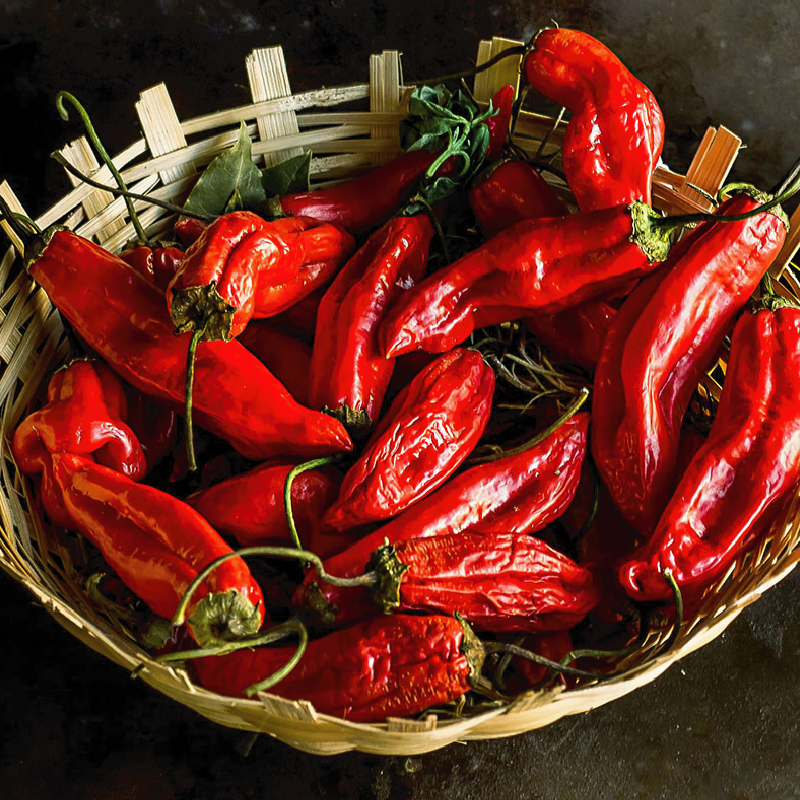Etnia -depeperwinkel
<tc>Merkén (merquén)</tc>
<tc>Merkén (merquén)</tc>
In stock
Unable to load availability for pickup
Merkén or in Spanish merquén is a blend based on the ground of the smoked Ají cacho de cabra, the goat horn chili. It is a specialty of the Mapuchen, an indigenous Chilean people, who call this chili caciocavra.
Now also in our own packaging
The Slow Food Foundation supports the cultivation of this caciocavra chili and the coriander that is inextricably linked to the merquén mixture traditionally made in Nagche and Wenteche in the Araucanía, an area in the south of Chile where many Mapuche people live.
In February, the goat's horn chilies, which are still green, are picked when they are about to turn red. By drying them in the sun, the chilies initially turn purple. Now it is time to smoke the chilies. They are smoked for half an hour at most over a fire of eucalyptus wood. After this, the chilies are laid out in the sun to dry a second time and only then are they ground. This is actually already an end product, comparable to the Spanish pimentons, but a semi-finished product for the production of merkén. In the past, merkén only contained chili pepper.
The ají cacho de cabra is a nearly two thousand year old capsicum annuum species, classified as a Chilean-Peruvian landrace. It was already cultivated during the Moche civilization in northwestern Peru, today mainly in the Maule region, La Araucania, and in Peru in the valleys in the provinces of Chiclayo and Lambayequem.
The Mochica were agriculturalists who lived from 100-750 AD in northern Peru in several valleys along the coast. Their territory was 400 kilometers long and reached 80 kilometers inland. They used advanced irrigation systems to grow their crops. They even owed their prosperity to it. The civilization ended after a period of heavy rains, followed by three decades of persistent drought (El Niño).
Merquén is a very special mixture. It is the ancestor of all chili powders. Merquén embodies the way the Mapuche held out against the European conquerors of the sixteenth and seventeenth centuries by tactically using European skills and integrate into their own culture. This is how coriander came into their originally chili pepper-only merkén.
Merkén symbolizes the steadfastness of the Mapuchen and has only recently started to enjoy the attention of chefs all over the world, interested in 'forgotten' products. Because that is what it is, until 2000 the outside world was not familiar with the product. Our Merquén is made according to a traditional Mapuche recipe with raw materials that come from various parts of Chile. It is made from this specific chili, roasted coriander, and some salt.
Much merquén outside of Peru is made with locally grown chiles, usually not goat horn chiles.
Work is underway to protect the species name. In that light, the inclusion in the Slow Food Foundation's Ark of Taste is a necessary first step.
Usage
The Cacho de cabra is one of the most important chilies in Mapuche cuisine, and from that tradition has found its way into modern Chilean cuisine.
It is often dried and ground for use in marinades and dishes such as chili con carne and in soup. After hydration, the pepper is used in sauces and pastes. The best-known application is in merquén, which is where the pepper gets its nickname ají merkén.
Traditionally, the Mapuche use merquén in mashed potatoes (puré picante) - the Mapuche territory is the origin of a large number of potato cultivars - and around peanuts (mani merkén).But also in traditional Chilean dishes such as lomito (a sandwich with marinated pork), chacarero (ditto, but with thinly sliced beef), on pizzas and in pebre, the famous Chilean sauce. But merkén also combines excellently with fish (salmon) and pumpkin - as well as the warm mashriq blend baharat.
In the Araucanía region grows the Araucaría, a tree known for its seeds, piñónes or pine nuts). A typical Mapuche dish is sautéed piñónes with merkén: the seeds are boiled and then fried with garlic, oregano and salt. Merkén is used as a finishing touch.
Features
- mixture of goat horn pepper (Capsicum annuum), roasted coriander seeds, salt
- We only supply the original brands, originating from Chile - brand name Etnia (Mapuche)
- no preservatives
Assortment
- in original Etnia packaging - 100 grams
- now also available in our own packaging, in glass and pouch
General advice
- store the merquén in the original packaging in a cool place, away from direct sunlight;
- After opening, the meal can be kept for at least three months, provided it is kept in a closed container
- If you want to keep your merkén for a long time, store them in the refrigerator, just like piment d'Espelette, between 3 and 5° C.
Best before:
- November 2026 (11-2026)
Share











